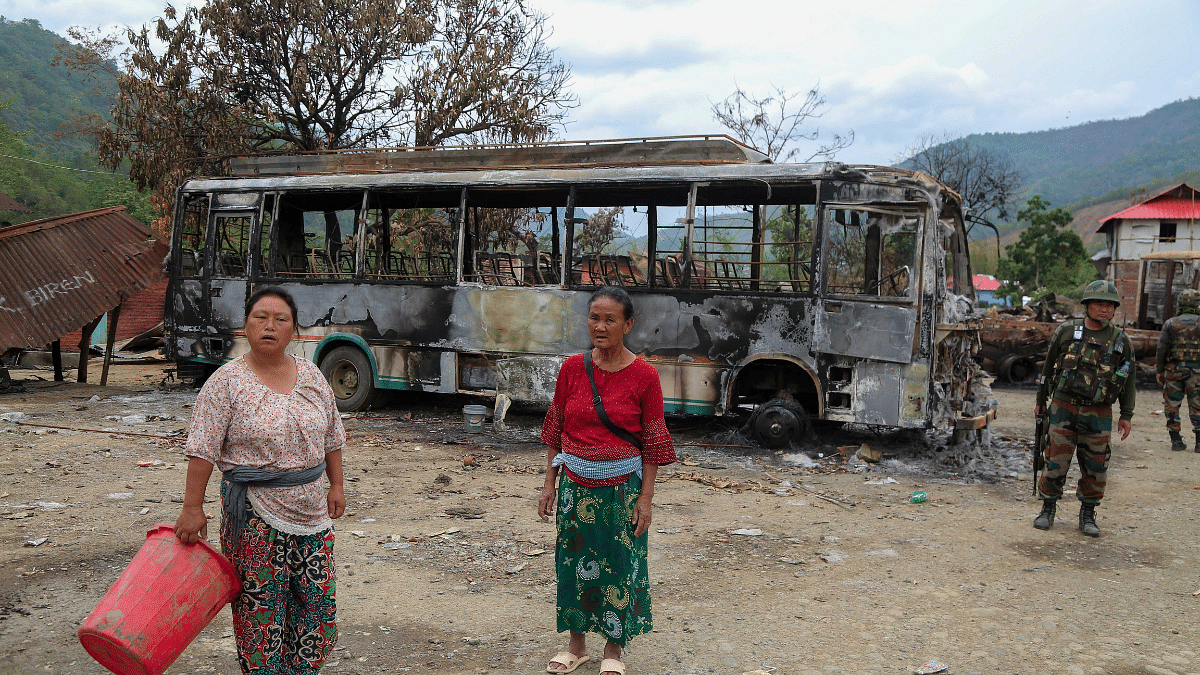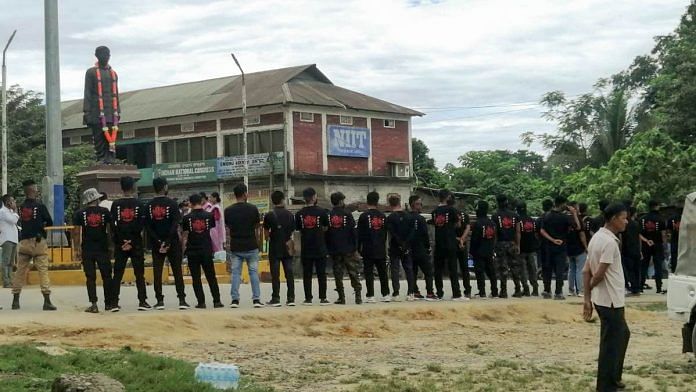New Delhi: The radical armed Meitei group, Arambai Tenggol (‘dart-wielding cavalry’ in Manipuri language), is ducking its notoriety and acquiring a position of unparalleled prominence in Manipur.
So much so that it is widely referred to as a “parallel government” in Manipur, as public disenchantment with the actual administration — and its failure to stop the ongoing ethnic violence — surges, well-informed sources in the state told ThePrint.
This impression stood bolstered as 37 MLAs of Manipur and the state’s 2 MPs — Lok Sabha and Rajya Sabha — answered the group’s “summons” for a meeting at Imphal’s historic Kangla Fort on 24 January.
Not only did the legislators attend the meeting, they pledged to fulfil the demands made by the group — updating the base year of the proposed National Register of Citizens (NRC) for Manipur to 1951, and abrogating the Suspension of Operations (SoO) agreement with Kuki insurgents — in 15 days. The group also reportedly made them take an oath to protect the integrity of the state.
One of the MLAs who attended the meeting subsequently told ThePrint that over three legislators were “beaten up” when they refused to agree to their demands — a claim backed by security sources and Congress leader Jairam Ramesh, who alleged a “brutal physical assault on Manipur Pradesh Congress Committee president K. Meghachandra” at the meeting.
While a second MLA told ThePrint that the final agreement was consensual even though there had been some disagreement, sources in the security establishment said the fact that the meeting was held at all was itself a testament to the group’s growing clout. The initial plan, the sources added, was to not allow it.
They said a comprehensive security plan, involving the deployment of over 2,000 personnel from the Central Reserve Police Force (CRPF), Assam Rifles, Indian Army and local police at the four gates of Kangla Fort, was in place in the run-up to the meeting — with a view to preventing it.
However, the sources added, the plan did not work out, as the armed group received approval from the authorities to proceed with the event at the last minute.
According to a source in the security establishment, this event has further bolstered the popularity of the armed group, as the Arambai Tenggol is being hailed by the public for standing its ground and compelling the government to accede to their demands.
Backed by widespread support and wielding influence over the government and police decisions, the group is “effectively calling the shots in Imphal”, the source said.
“It appears that Arambai Tenggol is running a parallel government here, where it even has the power to summon MLAs and MPs,” the source added.
“So much so that they can even administer an oath. They have garnered immense support in the valley (where the Meiteis dominate) in a short period and the people only trust them,” the source said. “They are now seen as a group who can influence the Centre and also deal with the security forces.”
This, even as “there are a number of allegations against them of violence, looting and burning of churches along with looting of police armouries”, the source added.
The meeting last month was attended by 37 Meitei MLAs and MPs Rajkumar Ranjan Singh (one of the state’s two Lok Sabha MPs, representing Inner Manipur, and a Union minister) and Leishemba Sanajaoba (the state’s lone Rajya Sabha member), who also belong to the Meitei community.
Congress leaders, including former chief minister Okram Ibobi Singh and state Congress chief Keisham Meghachandra Singh, were also present.
The only Meitei legislator not in the meeting was Chief Minister N. Biren Singh.
Also Read: What happened at Kangla Fort meeting between Arambai Tenggol & MLAs-MPs it had ‘summoned’
Arambai Tenggol & Manipur violence
The ongoing violence in Manipur began last May as decades of ethnic tensions peaked with the Meiteis’ demand to be categorised as a Scheduled Tribe (ST) to access reservation benefits they claimed were being cornered by the Kukis.
The Kukis saw this as an assault on their rights, saying the Meiteis anyway dominated government jobs and positions of power.
The wave of violence unleashed since has claimed over 200 lives, displaced thousands, and even sparked fears of ethnic cleansing.

The Meiteis dominate the state’s valley areas, including Imphal, while the Kukis form the majority in the hills. Since the violence erupted, the Kukis who lived in the valley have largely left, with the Meiteis based in the Hills doing the same.
The rise of the Arambai Tenggol comes in the backdrop of an increase in suspected Kuki militant activity — the increase first started with the violence, but has intensified over the past few weeks after a lull.
The demand for updating the base year for the proposed NRC to 1951 — the state cabinet fixed it at 1961 in 2022 — is rooted in allegations that Kuki-affiliated tribes from civil-war-struck Myanmar (among other “outsiders”) have been flooding into the state. The Kukis deny this charge.
Meanwhile, the SoO was signed in 2008 with an aim to resolve the conflict stemming from the Kukis’ demand for an “independent Kuki homeland”. As part of it, the Kuki militants were asked to end their activities and settle into designated camps aimed at their rehabilitation. In exchange, the security forces ceased their operations against them.
These SoO camps have emerged as a focal point of the ongoing violence, with the Biren Singh government accusing them of “contributing to the escalation of violence”.
The aforementioned security establishment source said the Arambai Tenggol was founded in 2020 as a cultural body, but soon transformed into a radical armed outfit.
It faces many allegations of violence, looting and arson attacks on churches amid the ongoing ethnic conflict.
After the 24 January meeting, Korounganba Khuman, the group’s chief, addressed a public gathering and said the Arambai Tenggol had called the legislators to make a point that ministers and MLAs are not above the people.
He said that “if the Centre does not listen, we will take the movement to the people to protect Manipur”.
‘To avert potential clash’
A second intelligence source said the decision to allow the group to hold the meeting was taken after consultations with the special team of senior serving and former Intelligence Bureau (IB) officers sent to the state by the Centre to “manage the situation”.
According to the source, the rationale behind this move was to “avert any potential clash”, given that the armed group has garnered significant local support among the Meiteis in the valley.
“Such is the support for them that, had the meeting been cancelled, the people would have started burning police stations, cars and posts, and would have vandalised property,” the source said.
So, it was decided that one member from each of the Arambai Tenggol’s 59 units would be allowed to go inside the fort, the source said, adding, “They were asked to leave the weapons out.”
More than 60,000 civilians gathered outside the fort to welcome members of the Arambai Tenggol after the meeting, the source said.
“People in thousands gathered to hail and laud the group. The Meira Paibis (Meitei women collectives) celebrated, calling the group their last hope for a solution for Manipur,” the source added.
Following the meeting, Indigenous Tribal Leaders’ Forum (ITLF) spokesperson Ginza Vualzong issued a statement expressing shock at the clout of the Arambai Tenggol.
The statement said it was the “first time in history”, that a “militia that led attacks on innocent civilians because of their ethnicity and which openly displays sophisticated weapons stolen from police armouries was able to order state lawmakers, including the chief minister, to attend a meeting it had called and made the MLAs endorse their demands”.
“Why did the world’s largest democracy allow this?” the statement from the ITLF, a conglomerate of Kuki outfits, said.
(Edited by Sunanda Ranjan)
Also Read: ‘Protection money’ to Arambai Tenggol — how traders are operating in strife-torn Imphal



